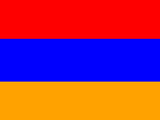|
|
TODAY.AZ / Politics
Armenian official calls on Turkey to establish diplomatic ties
24 January 2007 [21:54] - TODAY.AZ

"Armenia's wish is for diplomatic relations to start without any conditions," Arman Kirakosian told reporters after visiting the family of an ethnic Armenian journalist killed in Istanbul on Friday.
Turkey and Armenia have no diplomatic relations, and the border between the two countries has been shut since 1993 because of Armenia's unresolved conflict with Azerbaijan — a close Turkish ally — over the disputed enclave of Nagorno-Karabakh. Relations are further complicated over the World War I-era killings of Armenians.
"We have been an independent state for 15 years, but unfortunately, we have no relations with Turkey," Kirakosian said. "Different countries have diplomatic relations despite having problems."
Turkey has been calling on Armenia to resolve its territorial conflict with Azerbaijan and respond to Turkish calls to jointly investigate the deaths of Armenians during the fall of the Ottoman Empire.
Earlier, Turkey's Foreign Minister Abdullah Gul complained that Armenia had not so far responded to Turkish calls.
"Of course, we would like to develop our ties with Armenia," Gul said.
Gul said, however, that Armenia should "not make unfair demands on Turkey," in an apparent reference to Armenian insistence on recognizing the killings as genocide.
"The neighboring country should also review its thoughts, its sentiments toward Turkey," Gul said.
Last year, Turkish and Armenian officials met to discuss normalizing relations. Although the talks apparently led to no breakthroughs, the fact that the two countries were talking was considered one in itself.
Armenians say that Ottoman Turks slaughtered 1.5 million Armenians in a planned genocide. Turkey vehemently denies that the mass killings were genocide, saying the death toll is inflated and Armenians were killed in civil unrest as the Ottoman Empire collapsed. The Associated Press
/The International Herald Tribune/
URL: http://www.today.az/news/politics/35414.html
 Print version
Print version
Connect with us. Get latest news and updates.
See Also
- 04 December 2024 [12:16]
Macron versus the French: Who will send whom? - 04 December 2024 [11:16]
Armenia forces to talk about the deportation of Azerbaijanis - 04 December 2024 [11:06]
Ali Asadov and Mikhail Mishustin discuss key bilateral issues in Baku - 04 December 2024 [10:22]
Azerbaijani Foreign Minister Jeyhun Bayramov visits Malta - 04 December 2024 [10:00]
IDPs return to reconstructed Shusha under Great Return Program - 03 December 2024 [15:24]
Azerbaijan discusses strengthening cooperation at 28th ECO Foreign Ministers' meeting - 03 December 2024 [14:22]
Azerbaijan elected as chair of UNCCD regional group and COP16 Bureau member - 03 December 2024 [13:32]
U.S. ambassador to Azerbaijan Mark Libby retires from U.S. diplomatic service - 03 December 2024 [13:00]
Stupidity versus cowardice: a new round of confrontation between Pashinyan and Aghazaryan - 03 December 2024 [11:05]
Turkiye appoints new ambassador to Azerbaijan
Most Popular
 How the West betrayes and continues to betray Georgia and Ukraine
How the West betrayes and continues to betray Georgia and Ukraine
 "Armenian heritage" exists as long as it's funded – how CHW deceives the world.
"Armenian heritage" exists as long as it's funded – how CHW deceives the world.
 Secretary Blinken and Turkish FM Fidan discuss situation in Ukraine and S Caucasus
Secretary Blinken and Turkish FM Fidan discuss situation in Ukraine and S Caucasus
 Azerbaijan Defence Ministry presents weekly review
Azerbaijan Defence Ministry presents weekly review
 Armenian whining and the Azerbaijani magic wand
Armenian whining and the Azerbaijani magic wand
 Azerbaijan discusses strengthening cooperation at 28th ECO Foreign Ministers' meeting
Azerbaijan discusses strengthening cooperation at 28th ECO Foreign Ministers' meeting
 Milli Majlis hosts public hearing on return to Western Azerbaijan
Milli Majlis hosts public hearing on return to Western Azerbaijan
